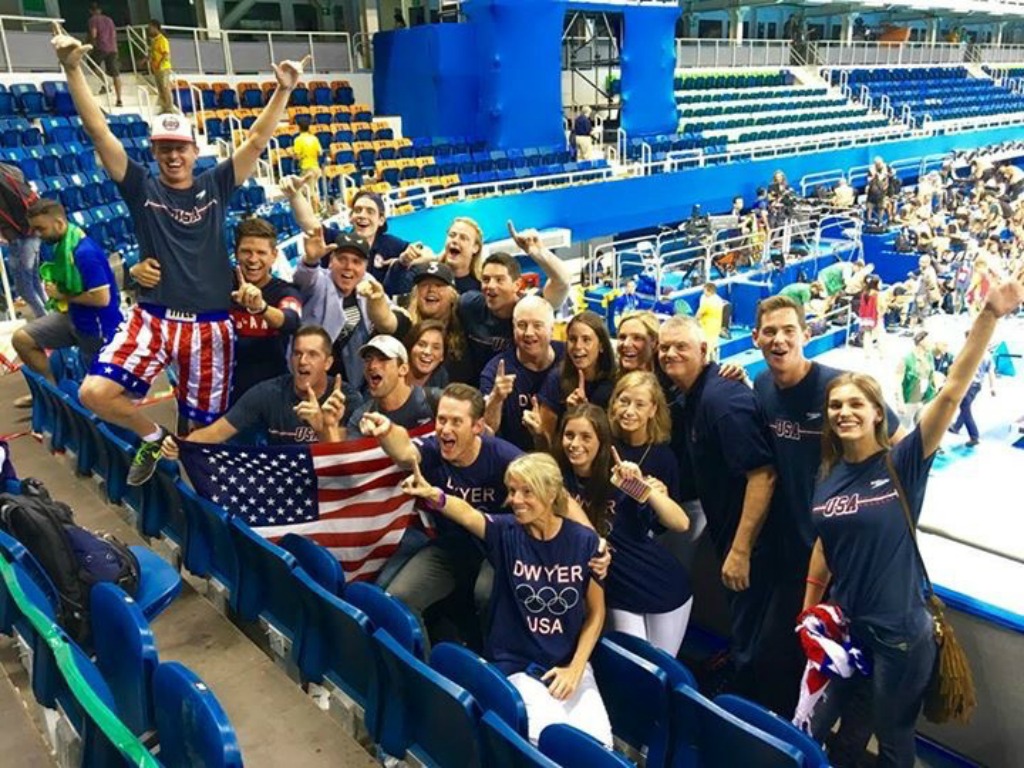
No two athletes on team USA have the exact same upbringing. But there seem to be a few themes Olympians have in common when it comes to how they were parented. I have yet to hear an athlete say they made it to the Olympics because of how hard their parents pushed them, or because when they were nine, their mom and dad carefully put together the perfect roster for their youth sports team to include only the top talent in town. In fact, it seems to be the exact opposite.
Here are four things I’ve learned spending time in at the Rio Olympics with athletes and their parents about how to be a good sports parent.
By Alex Flanagan
how to be a good sports parent
LET YOUR CHILD DISCOVER THEIR OWN PASSION:
17-year-old Aria Fischer and her 19-year-old sister Makenzie are teammates on the U.S. women’s water polo team. Both of their parents played water polo. Their father, Erich Fisher, is also an Olympian, having competed in water polo for the U.S. at the 1992 Olympics in Barcelona, Spain. Not forcing water polo down their daughter’s throats may have actually been what made them love it.
I asked Aria what her parents did that led to her success. “They wanted me to do every sport and they wanted me to find the sport that I loved and that I was passionate about if I wanted to do sports and I think just letting me make the decision and not pushing me into anything, made me really love what I do and you have to be passionate about what you do in order to be good at it.” You will know it when your child feels passionate about something. Trust me.
BE A POSITIVE DISTRACTION FROM THE PRESSURES OF SPORTS:
Youth sports are packed with pressure. Kids don’t need parents putting more stress on them when it comes to competition and practice. When parents make sports only about success it takes all the fun out of it.
More than one parent in Rio told me they made a point of not talking about their child’s sport when they saw him or her. In Fact, the most important role of the parents was to give their kids a reprieve from Olympic life. Taking them out to dinner, sightseeing or shopping with them.
I bumped into American diver Kristian Ipsen and his mom in Rio the day before his competition started. They were laughing and smiling as they walked home from checking out some of the local shopping in Rio. How nice to have someone you know you can be yourself around to ease your mind away from competition.
REMEMBER THAT YOUR MOST IMPORTANT JOB IS BEING A SOLID SUPPORT SYSTEM:
Olympian Conor Dwyer’s family has turned supporting the swimmer into an Olympic sport of it’s own. About 20 members of the group now dubbed “Dwyer nation” were in Rio cheering like crazy for Connor.
“It meant everything to have my parents, brothers, sister, cousins, aunt, uncle and friends in Rio with me. Hearing them cheer ‘Conor Dwyer’ and ‘USA’ before my races got me ready to go!” Dwyer told me after winning bronze and gold medals in Rio.
He credits his mom, a former swimmer, for getting him in the pool when he was two years old. But what’s most important to him has been having her by his side while he’s pursued his dream, “My parents have loved and supported me throughout my journey. Through the ups and downs, they are always there. This is the biggest thing anyone could ask for. Their support lifts me higher to reach my goal.”

Dwyer nation stateside. Relatives and friends in Illinois cheering on Conor.
WIN OR LOSE, LOVE YOUR CHILD THE SAME WAY: We all want to see our children succeed, but when they don’t, they need to know they are loved the same regardless of their performance. Sports psychologist Mara Smith says it’s important to remind young athletes they are not defined by a performance or outcome. They are the same people they were before the event. “Being an athlete is PART of who you are as a person. Not the only defining quality,” says Smith. In youth sports, says Smith, often the parents are more disappointed than the kids are and therein lies the greatest problem. It seems like it can be crushing for athletes to lose (especially on a world stage), but truly, getting to the Olympics is already a huge win.

MORE: What Happened When My Child Was Exposed To Olympic Development Training











